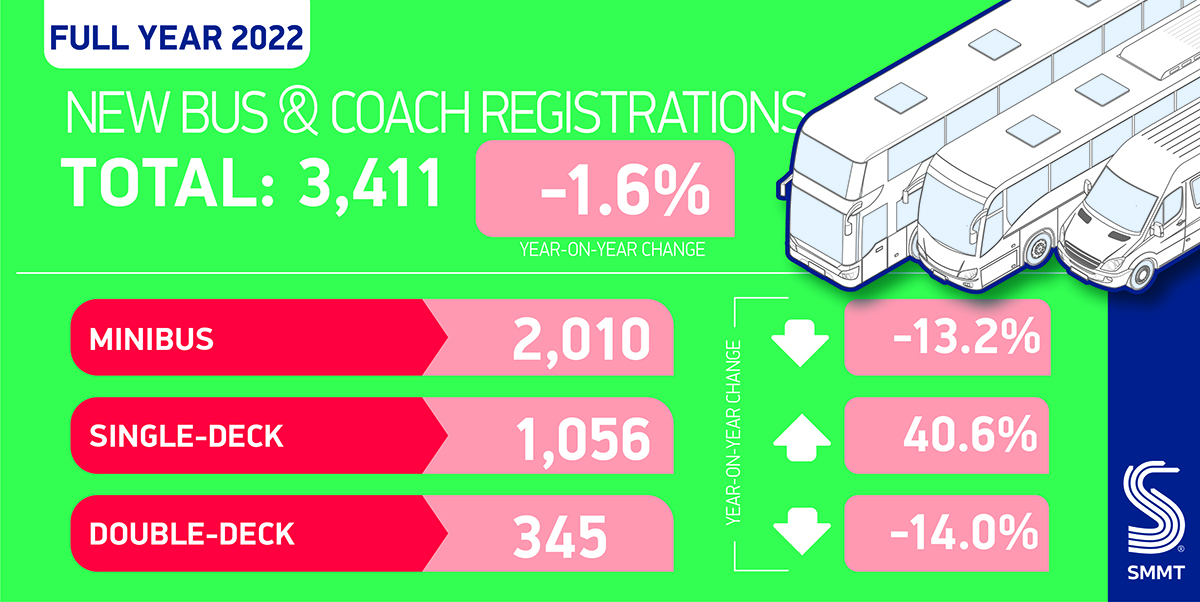- Demand for new buses and coaches declines by -1.6% in 2022, with 3,411 units joining UK roads.
- Single-deck bus registrations grow 40.6%, but minibuses – the largest volume segment – fall by -13.2%.
- Despite growth from Q1 to Q3, a particularly slow Q4, down -30.1%, rounds off weakest year since records began.
- Sector looks to government’s Zero Emission Bus Regional Area funding and passenger incentives to boost zero emission recovery in 2023.
SEE BUS & COACH REGISTRATIONS BY BRAND
DOWNLOAD PRESS RELEASE AND DATA TABLE


UK new bus and coach registrations fell by -1.6% in 2022 with 3,411 new single-deck, double-deck buses and minibuses joining Britain’s roads, according to figures published today by the Society of Motor Manufacturers and Traders (SMMT). A particularly weak Q4, which saw registrations decline -30.1%, offset growth recorded during the first nine months of the year,1 amid signs that ridership levels were beginning to recover.2 However, passenger numbers remain below pre-pandemic 2019 levels as operators continue to face significant financial constraints on fleet renewal.
The overall decline in 2022 was driven by minibuses weighing up to six tonnes and with 17 seats, the largest segment by volume, which fell -13.2% to 2,010 units. Single-deck bus registrations, however, grew by 40.6% to 1,056 units, while double-deck deliveries declined by -14.0%, representing 345 units. As single- and double-deck buses are leading the way in the rollout of affordable, zero emission mass mobility, it is crucial that funding is delivered to all regions of the UK to boost the sector’s ability to renew fleets with the latest technology.


As Britain’s bus fleet is essential to delivering Net Zero and providing vital mobility to people across the country, six successive years of decline mean action is needed urgently to restore confidence. The sector is relatively advanced in its green transition, with the proportion of the bus parc that is zero emission already on par with cars at the end of 2021, helping to improve air quality and reduce CO2. Rollout has been accelerated by the Zero Emission Bus Regional Area (ZEBRA) scheme, with further deliveries expected this year. Progress, however, will depend on a smooth and timely funding process.
Government initiatives such as the Bus Fare Cap Grant can raise operator confidence in passenger numbers but longer term commitments to increase ridership following the pandemic are needed to create the right conditions for operators to invest. In doing so, the sector can deliver affordable, zero emission mass mobility, serving communities across the UK and protecting jobs and livelihoods in the process.


Mike Hawes, SMMT Chief Executive, said,
The bus and coach market is essential to our net zero targets and, as ridership levels begin to show signs of recovery, a long-term, sustainable commitment to green investment is needed. In particular, ZEBRA funding must be delivered more swiftly, ensuring rollout of the latest, zero emission buses and coaches to regions across the UK, improving air quality and the passenger experience.




Notes to editors
- 2022 is the weakest performing year since records began in 1996.
- Latest UK government quarterly bus statistics, England, April to June 2022
